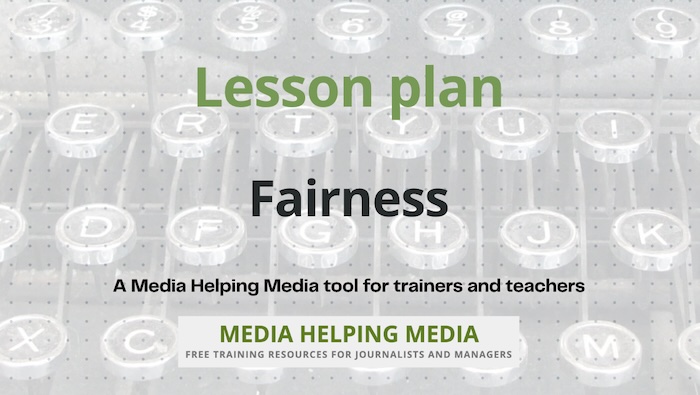
Fairness in journalism means exploring all sides of an issue and reporting the findings accurately.
Members of the public should never be used to exaggerate the importance of a story. As a journalist you have a responsibility to examine your own motives, and ensure that your personal feelings and emotions do not influence what you report, whom you talk to, or determine which elements of the story you highlight.
You also need to think carefully about the language and tone you use to ensure that it doesn’t give an inaccurate and unfair representation of the facts. Your job is to inform the public debate, not manipulate that debate. You are working on behalf of the public, not using them for your own ends.
A journalist should have no motivation other than presenting sourced and verified facts. You should not have a desired outcome – that’s activism. And some would argue that journalism and activism are not compatible. You do your job regardless of the outcome.
Right of reply
You should always offer the right of reply when making allegations. However, there will be some cases where this rule needs to be checked with senior editorial colleagues.
If, for example, you uncover information that you consider to be in the public interest, and which involves serious allegations against an individual or group, it might not be appropriate to approach those who are the focus of your investigatioin.
This is particularly important if the information could lead to criminal arrest. In most cases, the fact that a person has agreed to be interviewed is sufficient to prove informed consent.
However, care needs to be taken when dealing with young people, the vulnerable, and those who have been recently bereaved or have suffered from trauma.
Those you are going to quote must be told when the material will be used, in what context, and how the material will be used.
This is particularly important with broadcasters and with any media organisation operating a converged newsroom delivering content to multiple platforms or devices.
It may seem obvious to you that the material will be searchable online and viewed worldwide, but your contributor may not have thought this through, especially if they are under stress. It is only fair to point it out.
If the member of the public is making a significant contribution, on which the whole item or broadcast programme is based, this needs to be made absolutely clear to them. They have a right to know:
- if there is a discussion or debate surrounding their contribution and, if so, the range of views being represented and the likely contributors.
- whether their contribution is live or edited and when it is likely to be broadcast (be careful not to give assurances if the broadcast time could change).
- a broad outline of the way you see the discussion going (your reasons for doing the piece).
- any changes leading up to broadcast or publication.
You do not need to let them see any pre-recorded material, or material that is likely to be published online, even if they are involved.
You should avoid inviting them to proof-read what you are writing; that could lead to pressure to make changes that are editorially unacceptable.
If a preview is requested, you need to examine the editorial, legal and ethical reasons for this.
Seeking a response
In cases where there are allegations of wrongdoing, you need to offer a fair opportunity for people to respond to the allegations before broadcast or publication.
When seeking a response, you need to keep accurate records of when, how and where the person was approached, along with their response to the offer.
If the material is for TV and radio, that response needs to be broadcast in the same programme, or at the same time, as the allegation is made. Again, legal reasons might override this.
Editorial independence
Contributors sometimes try to impose conditions before agreeing to take part in interviews. You must retain editorial control and not enter into any agreement that stops you asking the questions your audience would expect you to pose.
It is unlikely that it would ever be appropriate to broadcast or publish an interview in which the contributor sets out what she or he is prepared to be interviewed about. However, if such a case arises, it must be made clear to the audience the conditions that were set in order to obtain the interview.
The contributor must also be told that you will be making this clear before and after the interview is aired/published. They need to understand that journalists deal with news, and are not public relations (PR) consultants offering a PR platform.
In some cases, people who have already been interviewed will decide to withdraw their consent. You should consider their objections, but whether you use the material or not is an editorial decision and must be based on whether it is in the public interest to publish the material.
You should be open to signing agreements for access to premises or to talk to staff, but you must examine the agreements closely to ensure that they do not involve the surrendering of editorial control. To do so would compromise your editorial integrity.
The same is true of indemnity forms. In all cases, if unacceptable conditions are imposed, you should withdraw from the project.
You should never ask contributors to expose themselves to health and safety risks, and they must make clear in writing that they recognise and accept any risks.

Questions
- What is the primary responsibility of a journalist?
- How should journalists deal with their personal feelings and emotions when reporting a story?
- Why is it important for journalists to consider the language and tone they use in their reports?
- What is meant by the “right of reply” in journalism?
- Under what circumstances might a journalist not approach the subject of an investigation for a response?
- How should journalists handle contributions from members of the public in their reports?
- What are the potential risks of allowing contributors to proof-read journalistic material?
- Why is it important for journalists to maintain editorial independence during interviews?
- How should journalists respond if a contributor withdraws their consent after an interview?
- What precautions should journalists take when signing agreements for access to premises or interviews?
Answers
- A journalist’s primary responsibility is to present sourced and verified facts without a having a desired outcome.
- Journalists should ensure their personal feelings and emotions do not influence their reporting, whom they talk to, or which elements of the story they highlight.
- Considering language and tone is important to avoid giving an inaccurate and unfair representation of the facts and to inform rather than manipulate public debate.
- The “right of reply” means offering individuals the opportunity to respond to allegations before they are broadcast or published.
- Journalists might not approach the subject of an investigation if the information involves serious allegations that could lead to criminal arrest.
- Journalists should inform contributors about how their material will be used, the context, and any potential changes leading up to publication or broadcast.
- Allowing contributors to proof-read material could lead to pressure to make editorially unacceptable changes.
- Maintaining editorial independence ensures that journalists can ask the questions their audience expects and avoid being influenced by contributors’ conditions.
- If a contributor withdraws consent, journalists should consider their objections but base the decision to use the material on whether it is in the public interest.
- Journalists should examine agreements closely to ensure they do not surrender editorial control, which would compromise editorial integrity.
Lesson plan for trainers
If you are a trainer of journalists we have a free lesson plan ‘Fairness in journalism‘ which you are welcome to download and adapt for your own purposes.
Note: This site was been given permission to use and adapt elements of the BBC’s Editorial Guidelines in these short editorial ethics modules. They have been updated to reflect changing international, regional and cultural variations.









